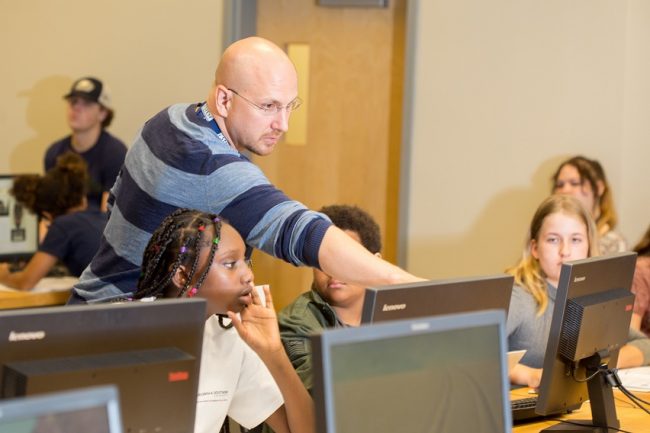CEIT receives NSA/NSF grant to teach middle school students cybersecurity

Bronwin Parish, a seventh grader at Esther F. Garrison School of Arts in Savannah, Georgia, now knows how to practice safe internet use thanks to the Junior Investigators’ Summer Experience, hosted at Georgia Southern June 19-23.
“I didn’t really know much about cybersecurity, and then I heard about this camp,” Parish said, standing next to her group’s poster display. “I was really excited to learn about different kinds of hackers. There are even good kinds of hackers! They help keep your computer safe. They capture blackhat hackers, the bad ones.”
The weeklong camp gave 40 middle school students from the region the chance to be immersed in the college environment, where they learned about cybersecurity with hands-on activities.
The week was made possible by a grant from the National Security Agency (NSA) and National Science Foundation (NSF). This week-long camp was offered at no cost to the participants, and was led by University faculty.
Kania Greer, Ed.D., coordinator of the Institute for Interdisciplinary STEM Education, Hayden Wimmer, Ph.D., assistant professor, and Lei Chen, Ph.D., associate professor in the Allen E. Paulson College of Engineering and Information Technology, worked together as “co-investigators” to develop the camp. They created programs and activities that used digital forensics to teach the First Principles of Cybersecurity. Greer coordinated the logistics of keeping 40 young students active throughout the week while Wimmer and Chen focused on cybersecurity content
Participants lived in Georgia Southern style, staying in the residence halls, eating at the Dining Commons and participating in activities throughout campus. They worked in lecture halls and computer labs, truly getting a feel for the technological resources offered at the University.
“We hope that by giving them some exposure to the campus, maybe they’ll be excited about coming to college,” said Wimmer. “This is the pivotal age for influencing kids to come to college, and we have the chance to influence their young minds with this camp.”
In addition to campus activities, students also took a field trip to the NSA at Fort Gordon in Augusta, Georgia, for a behind-the-scenes tour.
For one mother, sending her seventh grade son to Junior Investigators was a decision she believes set him up for a successful future.
“This is my son’s first time being off somewhere for a week, out of town, so I wanted it to be a positive experience. I knew it would be since it was Georgia Southern,” said Marquita Lockett, of Macon, Georgia. “I really believe he learned a lot about cybersecurity and will hopefully want to pursue a career in this field someday. He already seems so excited.”
“We hope the students took home some new knowledge and got excited about the possibility of careers in STEM, computing and cybersecurity,” said Wimmer. “We at least feel confident that there are now 40 students who are aware of career options they never knew about before. There are a lot of really cool jobs in this field.”
Wimmer and his colleagues hope to leverage this Junior Investigators approach and results for a full NSF Innovative Technology Experiences for Students proposal to continue this work.
“They have some interesting high school programs at the NSA that I want to do now,” said Parish. “I definitely could see myself doing cybersecurity now!”
Georgia Southern University, a public Carnegie Doctoral/Research University founded in 1906, offers 118 degree programs serving 20,673 students. Through eight colleges, the University offers bachelor’s, master’s and doctoral degree programs built on more than a century of academic achievement. Georgia Southern is recognized for its student-centered and hands-on approach to education. Visit GeorgiaSouthern.edu.
Posted in Press Releases

